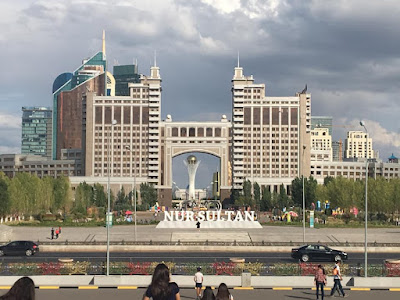In the late 1990s, Akmola/Astana was a small town in the middle of nowhere. After it became the capital the government poured its oil wealth into making a shiny new city in a place with very few people. So that was accompanied by a propaganda campaign to convince young and professional Kazakhs to move to the shiny new capital in the frozen steppes of southern Siberia. I saw that propaganda myself during our year in Kazakhstan (2009-2010). And it really seemed to work. Most young Kazakhs (which is most of who we talked to, for they were the ones who grew up after English was mandated in all schools and who could talk to us) wanted to move to, or at least visit, that gleaming fancy capital the government was constantly touting. The touting really was constant. The national airline became (and still is) Air Astana, the fanciest chocolates made in Kazakhstan were called "Astana". Astana really was everywhere during that year. But I think the relentless push selling the public on Astana not only sold the public on the city, it also created a real identification with that particular name.
In 2019, when Nazarbeyev finally stepped down as president, one of President Tokayev's early acts was to change the name of the capital to Nursultan. The one surprise was that they named it after President Nazarbeyev's first name rather than his surname (I was really expecting it to be "Nazarbeyev"). The change was really unpopular. First, Nazarbeyev himself was pretty unpopular at that point. But also two decades of messages about how great "Astana" is solidified that name in an entire generation of Kazakhs, the young professional Kazakhs who were fluent in English and were beginning to become influential in Kazakh society. When we visited Kazakhstan later in 2019, no one used the name "Nursultan". If I used the new name, it would be met with an eye roll.
Earlier this year, when anti-government protests broke out across Kazakhstan, the protests were as much against former President Nazarbeyev (who was widely viewed as pulling the strings behind the scenes) as it was against the official Tokayev government. While Tokayev resisted a lot of the democratic reforms the protested demanded (and eventually called in the Russian military to violently put down the protests), he immediately got behind the demands to end Nazarbeyev's role in governing. The former president was removed from the powerful security council, and now many of his family members and other people close to him are being prosecuted for corruption. Once that happened, it was pretty clear that the capital was not going to keep the name of the now-disgraced former president much longer. It's just funny that a generic placeholder name that just means "capital" is now pretty widely recognized as the best name for the city.

